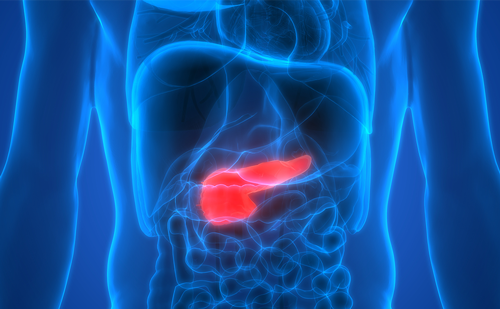Insights into CCBs and pancreatic cancer presented at American Association for Cancer Research Annual Meeting, Chicago, IL, US, April 14–18, 2018.
Pancreatic cancer will be responsible for approximately 44,330 deaths in 2018 in the US, according to the American Cancer Society (ACS).1 It is one of the most feared malignancies because of its dismal prognosis; for all stages combined, the 1-year relative survival rate is 20%, and the 5-year rate is 7%.1 Pancreatic cancer occurs most commonly in older individuals, who often have other chronic health conditions such as hypertension. The news, therefore, that an antihypertensive medication may increase the risk of pancreatic cancer in postmenopausal women, has attracted considerable media attention.
The study, which was presented at the at the American Association for Cancer Research (AACR) Annual Meeting, April 14–18, 2018, in Chicago, was a prospective cohort study of 145,551 postmenopausal women aged 50–79 years who were enrolled in the Women’s Health Initiative, a long-term national health survey, between 1993 and 1998.2 This study investigated the possible relationship between antihypertensive drugs and the soluble receptor for advanced glycation end-product (sRAGE). This soluble form of the RAGE receptor acts as a decoy to avoid interaction of RAGE with its pro-inflammatory ligands and therefore has anti-inflammatory effects.3 Serum levels of the receptor have been found to be inversely associated with pancreatic cancer risk.4 Several studies have found that levels of sRAGE are decreased in patients with hypertension.5–7 Some antihypertensive medications have been shown to increase levels of sRAGE,8 therefore, the researchers expected that the use of antihypertensive medications would lower pancreatic cancer risk. They were, however, surprised to find an increased risk of pancreatic cancer among users of short-acting calcium channel blockers (CCBs).
Participants in the study provided details of all medications they were taking, including duration of use, and dosage form. Researchers analyzed data on four types of antihypertensive medications: beta blockers, diuretics, angiotensin converting enzyme inhibitors (ACEi), and CCBs. Cox proportional hazard regression models were used to assess any possible association of drug use with pancreatic cancer risk.2
At the time of data cut-off on August 29, 2014, 841 cases of pancreatic cancer cases had been identified among the participants. Using an immunoassay, serum levels of sRAGE were measured among 489 of the women with pancreatic cancer and 977 non-cancer controls. After adjusting for age, ethnicity, body mass index, smoking status, diabetes history, and use of other antihypertensive medication, women who had ever used CCBs had a 66% increased risk of pancreatic cancer compared with those who had ever used other antihypertensive drugs. Women who had used short-acting CCBs for 3 or more years had a 107% higher risk of pancreatic cancer compared with those who had ever used other antihypertensive drugs. There was no significantly increased risk with the use of long-acting CCBs or any other class of antihypertensive drugs. In addition, women who had ever used short-acting CCBs had significantly lower sRAGE levels than women who used any other anti-hypertensive medications (1,158 pg/mL versus 1,446 pg/mL, p=0.032).2
Further investigation is needed to determine the mechanism underlying this increased risk. Advanced glycation end products and their receptors are known to are known to play a role in the pathophysiology of hypertension but the effect of antihypertensive agents on sRAGE levels has not been studied in detail.9 The authors suggested that blockage of the calcium channel may reduce the release of sRAGE, thereby decreasing the anti-inflammatory effect.10 Chronic inflammation is a known risk factor for pancreatic and other cancers.11
Lead investigator Zhensheng Wang, PhD, of the Dan L Duncan Comprehensive Cancer Center at Baylor College of Medicine, Houston, said: “Our findings on short-acting CCB use and pancreatic cancer risk are novel and of potential broad medical and public health significance, if confirmed. Short-acting CCBs are still prescribed to manage hypertension, which is one of the components of metabolic syndrome, and metabolic syndrome is a possible risk factor for pancreatic cancer.”10
Since this observational study was restricted to postmenopausal women in the United States, we do not know whether this association would occur in men, premenopausal women, or in populations outside the United States.
At the press conference following the presentation, Suzanne L Topolian, MD, of the Sidney Kimmel Comprehensive Cancer Center at Johns Hopkins University in Baltimore, advised caution in interpreting these results. “I think this is potentially interesting, but very early,” she said. “It’s a relatively small number of people. There are other ways now to examine this question, this was an important first step but it needs more study.”
Nevertheless, if confirmed, these are important findings. Short-acting CCBs are commonly prescribed drugs, and it is important for physicians and patients alike to be aware of this potential risk.
References
1. America Cancer Society. Cancer Facts & Figures 2018. Available at: www.cancer.org/research/cancer-facts-statistics/all-cancer-facts-figures/cancer-facts-figures-2018.html (accessed June 21, 2018).
2. Wang Z, White D, Cheng L, et al. The association between antihypertensive medication, sRAGE, and risk of pancreatic cancer: Results from the Women’s Health Initiative Study. Presented at: American Association for Cancer Research (AACR) Annual Meeting; April 14–18, 2018. Chicago, IL, US.
3. Maillard-Lefebvre H, Boulanger E, Daroux M, et al. Soluble receptor for advanced glycation end products: a new biomarker in diagnosis and prognosis of chronic inflammatory diseases. Rheumatology (Oxford). 2009;48:1190–6.
4. Jiao L, Weinstein SJ, Albanes D, et al. Evidence that serum levels of the soluble receptor for advanced glycation end products are inversely associated with pancreatic cancer risk: a prospective study. Cancer Res. 2011;71:3582–9.
5. Heidland A, Sebekova K, Schinzel R. Advanced glycation end products and the progressive course of renal disease. Am J Kidney Dis. 2001;38:S100–6.
6. Mayer O, Seidlerova J, Filipovsky J, et al. 7C.06: soluble receptor for advanced glycation end-products and increased aortic stiffness in a general population. J Hypertens. 2015;33 Suppl 1:e97-8.
7. Geroldi D, Falcone C, Emanuele E, et al. Decreased plasma levels of soluble receptor for advanced glycation end-products in patients with essential hypertension. J Hypertens. 2005;23:1725–9.
8. Forbes JM, Thorpe SR, Thallas-Bonke V, et al. Modulation of soluble receptor for advanced glycation end products by angiotensin-converting enzyme-1 inhibition in diabetic nephropathy. J Am Soc Nephrol. 2005;16:2363–72.
9. Prasad K, Mishra M. Do advanced glycation end products and its receptor play a role in pathophysiology of hypertension? Int J Angiol. 2017;26:1–11.
10. American Association for Cancer Research. Short-acting Calcium Channel Blockers Were Associated With Increased Risk of Pancreatic Cancer in Postmenopausal Women. Available at: www.aacr.org/Newsroom/Pages/News-Release-Detail.aspx?ItemID=1185#.Wy46r6dKiUk (accessed June 22, 2018).
11. Momi N, Kaur S, Krishn SR, et al. Discovering the route from inflammation to pancreatic cancer. Minerva Gastroenterol Dietol. 2012;58:283–97.






